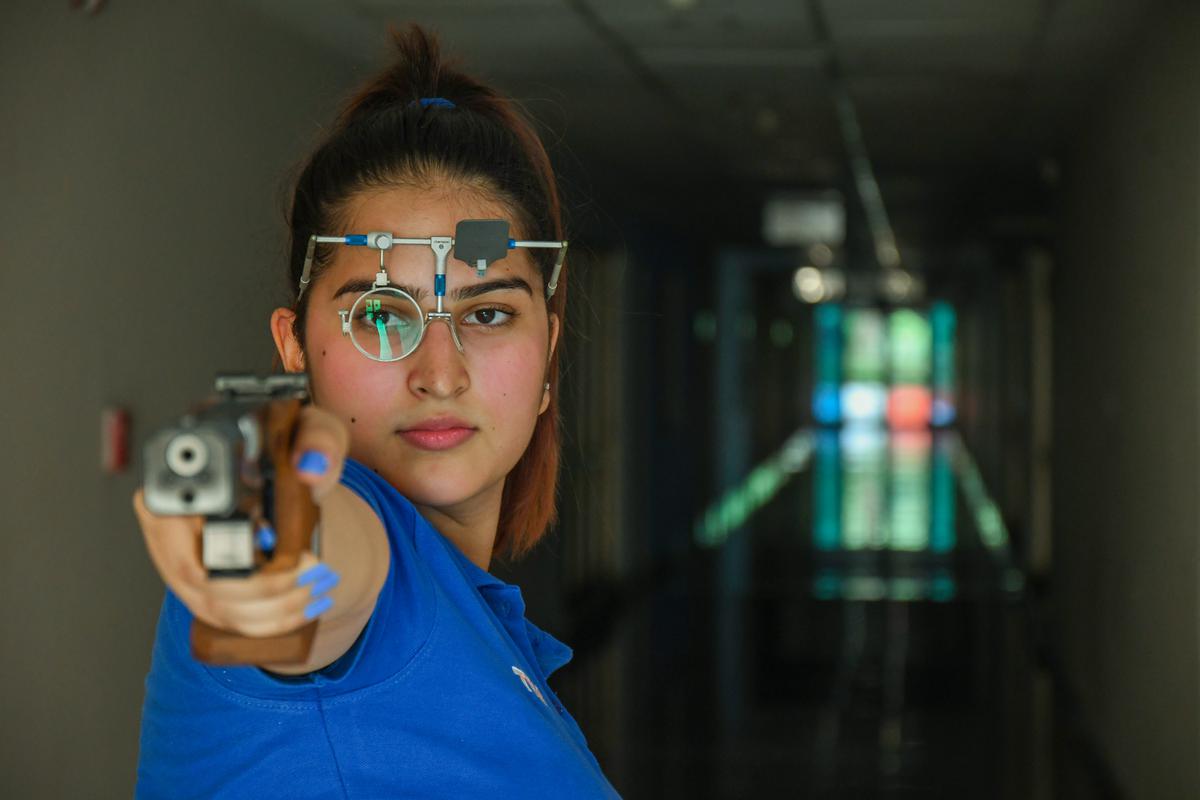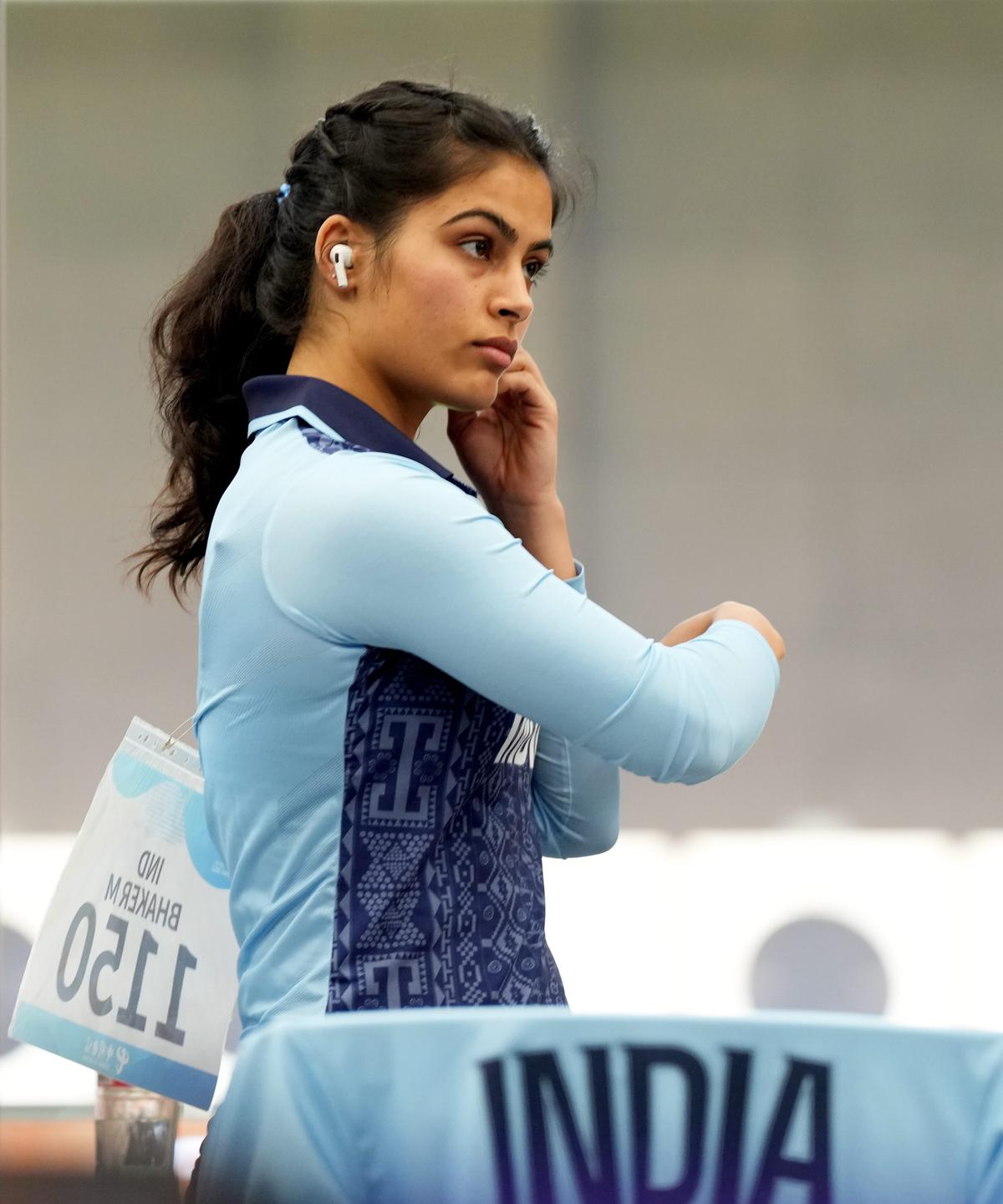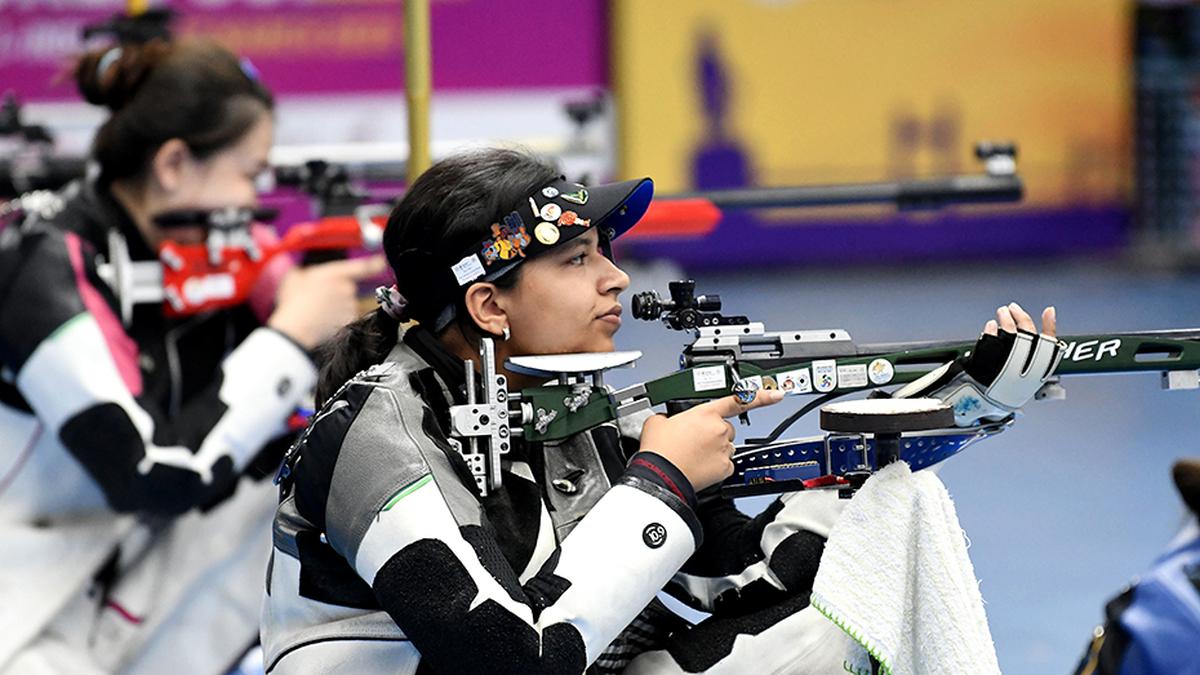Paris 2024 shooting: Olympics quota selection trials, bonus points explained with focus on Indian contenders
Indian shooting is on the verge of making a big impact on the world stage. The country has a large and talented pool of athletes who have received training and support from the government. In addition, each squad is backed by a team of experts who work tirelessly to ensure that the athletes perform their best when it matters most.
Two points give a fair indication of things to follow in Paris. The first is the number of Olympic quota places Indian shooters have been able to bag so far, with one more qualification event yet to be done. India has won 19 Olympic quota places out of a maximum possible 24. It’s important to keep in mind that only 340 athletes will be participating in shooting events at the Olympics. These consist of 15 competitions, including three mixed events. Shooters who qualify for individual events can compete in mixed events.
China leads the table of Olympic quota winners so far, with 22, while India is No.2. The USA has 18, followed by Korea (15), Australia (12), France (12), Egypt (11), and Germany (10) out of the 63 countries (as of March 7) that have managed to win the quota places. There will be 45 medals up for grabs.
The bitter experience of big squads of Indian shooters returning empty-handed from the last two Olympics in Rio and Tokyo may be fresh in memory. It may rankle a lot more than the joy derived from the brilliant performances of Rajyavardhan Rathore (Silver, double trap, Athens 2004), Abhinav Bindra (Gold, 10m air rifle, Beijing 2008), Vijay Kumar (Silver, 25m rapid fire pistol, London 2012), and Gagan Narang (Bronze, 10m air rifle, London 2012).
If anything, the experience has taught Indian shooters to approach the Olympics with more care and diligence. Indian shooters are world-class, no doubt, as they have shown over the years in global competitions. What is required is a nice passage to help them peak at the right time to strike the medals that matter in world sports, from July 27 to August 5, when the shooting events are staged at the Olympics in France.
“It is one grinder leading up to the Games. The team management must ensure that the athletes are not burned out. The Olympics is much more demanding, especially psychologically,” said Beijing Games gold medallist and air rifle ace Abhinav Bindra.
Abhinav tried to put things in perspective by considering the healthy scenario of Indian shooters performing well while reflecting on the earlier struggles of world-class Indian shooting teams during the Games.
“Last time, before the Tokyo Olympics, Indian shooters were away from home for a long time. The athletes were quite jaded. One size is not going to fit all. Young athletes, young minds. A 17-year-old’s mind works differently. Maybe they want to be at home. Maybe they miss their family. As athletes, we are human beings first. The softer elements matter. The battery must be full when our shooters line up for their events in Paris,” said Abhinav.

Hitting the bulls eye: Rhythm Sangwan secured a16th shooter quota for India at the 2024 Paris Olympics by winning a bronze medal in 25m sports pistol at the Asia Olympic Qualifiers in January. The Hindu photo library
| Photo Credit:
V. V. KRISHNAN
Hitting the bulls eye: Rhythm Sangwan secured a16th shooter quota for India at the 2024 Paris Olympics by winning a bronze medal in 25m sports pistol at the Asia Olympic Qualifiers in January. The Hindu photo library
| Photo Credit:
V. V. KRISHNAN
The shooters, if they are well prepared physically, technically, mentally, and emotionally, will have enhanced chances to strike medals this time in the Games.
All events except for the mixed pairs events of air pistol, air rifle, and skeet have qualification and finals on two different days. Originally, only rapid-fire pistol, sports pistol, trap and skeet events were spread over two days. The air pistol and air rifle individual events had qualification and finals on the same day in the past. The shooters have time to channel their energy and be at their best in their bid to win medals this time. Equally, it may be that much more difficult to grab medals.
Realigning our focus on the quota places, it has to be noted that the Indian rifle shooters swept all eight possible Olympic quota places before the pistol and shotgun shooters. The pistol shooters have grabbed seven of the eight possible quota places, with only the women’s second air pistol quota left to be won.
As we know, a country can win only a maximum of two Olympic quota places in an event. The ISSF made it harder for the shooters by introducing a new rule that a country can win only one quota per event in a qualification championship in the current Olympic cycle.
In trap and skeet, India has one Olympic quota each in the four events for men and women and can aspire to win one more in each of the four events.
It’s ironic that the Olympic trials for shotgun shooting, meant to determine the athletes representing the country, concluded before the announcement of selected shooters. This situation is akin to putting the cart before the horse!
If India fails to secure all available Olympic quota places in shotgun, this could be a contributing factor, despite the absence of official announcements regarding selected shooters. Some experienced shooters have expressed concerns about competitors not giving their best to secure Olympic quotas if they know they won’t be considered for the Paris Games.
From a general perspective, the quota winner rightfully deserves the opportunity to compete in the Games unless their performance drastically declines or another shooter consistently outperforms them on the international stage.
There was consideration for deciding the rifle squad for the Games in advance to alleviate suspense and allow shooters to prepare adequately. However, the national federation opted to conduct the rifle and pistol Olympic trials concurrently.
Abhinav spoke with the High-Performance Director (HPD), Dr. Pierre Beauchamp, who has put a system in place.
“My only advice to the HPD was that the trials could be very tiring and quite draining. The athletes need enough time to recover from it, recharge, and go into the Games fresh. It is an important element,” Abhinav said.
The world and Olympic champion, Abhinav, was also clear that the rifle shooters may not benefit from an early set of trials exclusively for them.
“The only guarantee in sports is that there is no guarantee! Give everyone a fair chance to gain their spots through the trials and have enough time to prepare and be at their best in the Games”, said Abhinav.
Is it fair to only consider the best three scores out of four from domestic trials to select the team for the Olympics? Why can’t we have a special status for a world champion like Rudrankksh Patil, or for that matter, Mehuli Ghosh, who won the quota with a World Championship silver medal?
Top of the world: Rudrankksh Patil became the 10m air rifle world champion in 2022 and secured an Olympic Games Paris 2024 quota.
| Photo Credit:
A. M. FARUQUI
Top of the world: Rudrankksh Patil became the 10m air rifle world champion in 2022 and secured an Olympic Games Paris 2024 quota.
| Photo Credit:
A. M. FARUQUI
Even when Abhinav was the reigning World Champion in the run-up to the 2008 Olympics, the federation authorities were considering the idea of putting the Asian champion for the Games based on current form. Luckily, they didn’t do this, and Abhinav went on to win the Olympic gold in Beijing. As the World Champion, Abhinav kept a low profile in the international arena, sharpening his skills and mastery of air rifle so he could peak at the right time and succeed in Beijing.
“The parameters keep changing. It is impossible to build a perfect plan. Despite the talent of Indian shooting, it is impossible to build a plan. In the past, it was ideal, as the difference between the first and the rest was massive. Or, after 1 and 2, the difference was huge. Fewer people had the chance to win a medal. It is impossible to follow the same method now as in the past,” opined Abhinav.
Apart from being a shooter who competed in five Olympics, Abhinav has also been closely studying the sport and the methods used by leading countries over the years.
“The NRAI (National Rifle Association of India) has changed its approach. They are trying to do something different. It is all that they can do. Stick to a policy announced in advance. There is no clear pathway or strategy. Collectively, we must back it. Going forward, it is a journey. Hopefully, it will get the results,” said Abhinav.
Yes, it is easy to find holes in the policy and criticise it. But as Abhinav pointed out, the dynamics of the shooting sport do not allow for a perfect plan and pathway.
“The USA has gone through many formulae for Olympic selection. They had their own selection to choose the best. Then, they changed, giving one of the two quota winners the chance for automatic selection based on consistent performances. World Championship certain score, reach a certain level to gain automatic selection. The US has now changed. The situation is dynamic and pragmatic in the current environment. The current policy gives hope that the results will be positive. They are working on the dynamics,” said Abhinav.
Looking closely at the selection policy, Olympian and coach of the cream of Indian rifle shooting, Deepali Deshpande, felt that “deemed quota winner” getting the same status as quota winners was weird.
To understand the deemed quota, it may be recalled that Tilottama Sen finished fourth in the World Championship but could not win the Olympic quota as Mehuli had won the quota with a silver. Luckily, Tilottama went on to win the quota later and thus did not need the advantage of a “deemed quota”.
“Winning quota is a different mindset. There is also a difference in winning the quota in the World Championship, Asian Championship, or much later in the qualifiers. It is not fair to treat all of them alike or give the same advantage to deemed quota winners as quota winners,” observed Deepali, who trains Sift Kaur Samra, Shriyanka Sadangi, Swapnil Kusale, and Akhil Sheoran apart from Olympian Anjum Moudgil.
Deepali did agree that the World Champion, Rudrankksh, deserved something special for the achievement.
“Rudrankksh is perhaps a little chilled. I really hope that he peaks at the right time and gets back to his level. The advantage of winning the Olympic quota is only 0.33 points. You are not giving them the right advantage for winning the quota,” said Deepali.

Making the cut: Tokyo Olympian Manu Bhaker finished fifth in the women’s 25m pistol event at the Asian Shooting Championships 2023 in Changwon, the Republic of Korea and in the process, secured a Paris 2024 Olympic quota for India.
| Photo Credit:
PTI
Making the cut: Tokyo Olympian Manu Bhaker finished fifth in the women’s 25m pistol event at the Asian Shooting Championships 2023 in Changwon, the Republic of Korea and in the process, secured a Paris 2024 Olympic quota for India.
| Photo Credit:
PTI
The advantage of winning the finals in trials is also negligible, and the bonus points for the first four places starting from 0.75 to 0.10 are kept separately to be considered only for breaking the tie after the tabulation of trial scores.
Now, compare that with the bonus points of 6, 4, 2, and 1 for the first four placed shooters in shotgun trials. Moreover, the shotgun shooters also get bonus points of 10, 8, 6, and 5 for the first four places in the World Championships. There are also high bonuses for similar spots in Asian championships, World Cups, and the final Olympic qualification event.
It is pertinent to note that the shotgun selection system was designed by coach Russell Mark before the Aussie quit in disgust. The process has stayed intact.
However, rifle coach Deepali is not worried about the selection of the rifle team, owing to a bunch of equally competent shooters.
“The rifle shooters are good, and so I am not worried about who gets selected. Air rifle women—they are all strong. In 3P women, Sift Kaur, Anjum, and Ashi Chouksey are very good,” said Deepali.
Deepali, who works quietly with her shooters, tuning them and their equipment for the best performances with careful planning, stressed that the Olympics was a different environment and different situation. And everyone needed to keep an open mind. She pointed out that the shortened current Olympic cycle of three years demanded a different approach in terms of the selection of shooters for the Games, apart from their preparation.
Quite smartly, the NRAI has put a line at the end of all its detailed Olympic selection criteria that the decision of the selection committee will be final and binding.
It will be interesting to see how well the selection of shooters for the Paris Games is done.
As always, Abhinav hit the nail on the head when he said, “The worst selection policy will become the best selection policy if the athletes win medals.”
Apart from the number of Olympic quota places, the second point that gives a clear indication of the prowess of the Indian shooters is their performance in the last Asian Games in Hangzhou, China.
The Indian team won a record 22 medals in shooting at the last Asian Games, seven less than the leader, China. India had seven gold, nine silver, and six bronze medals.
For those who are generally quick to point a finger at the team medals won in such a context and state the obvious that the Olympics does not have such team medals, it would be interesting to have a look at the individual medals won in the Asian Games shooting.
India won 10 individual medals, including two gold through Sift Kaur and Palak Gulia, apart from four silver medals, of which Esha Singh won a silver each in air pistol and sports pistol. In comparison, China won 14 individual medals in the Asian Games, and of course, eight of them were gold.
No matter how many World Cups India tops the medal table for, China is always in a different class at the Olympics and Asian Games.
As in many other disciplines, China is a giant in shooting. In the Asian Games, India won only one mixed event medal, the air pistol silver, through TS Divya and Sarabjot Singh. Indian shooters can win more mixed medals in the Olympics if they are tuned nicely for Paris.
Fortunately, there’s ample time remaining for Paris, allowing for careful selection and preparation of shooters, potentially resulting in a memorable Olympic experience.



